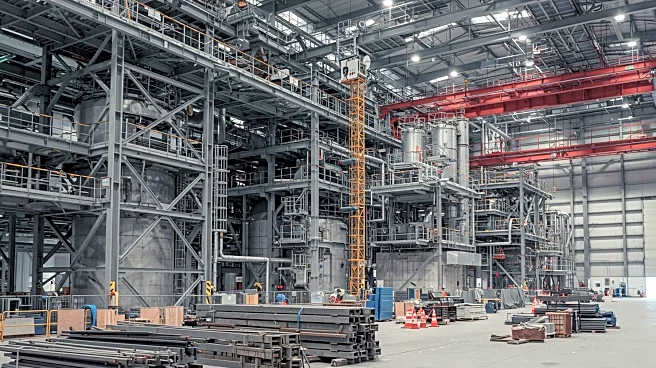What's Happening?
JBS USA has announced a $100 million investment to acquire and expand a former Hy-Vee production facility in Ankeny, Iowa. This facility will become JBS's largest U.S. operation for ready-to-eat sausage and bacon, utilizing products from other JBS plants in Iowa, including a new plant in Perry. The expansion is expected to create 400 jobs, with a focus on hiring former Hy-Vee employees who were laid off when the facility closed. Hy-Vee had previously announced the closure of the Ankeny plant, affecting approximately 330 workers, along with another facility in Chariton. JBS plans to leverage its existing pork production plants in Ottumwa, Council Bluffs, and Marshalltown to supply the Ankeny plant.
Why It's Important?
The investment by JBS USA is significant for the local economy, particularly in Ankeny and Perry, Iowa. The creation of 400 jobs at the Ankeny facility and 500 jobs at the new Perry plant will help mitigate the impact of previous job losses in the region, such as those from Tyson Foods' closure of its pork plant in Dallas County. This expansion aligns with JBS's strategy to increase its value-added and prepared foods offerings, which could enhance its competitive position in the U.S. meat industry. The move also reflects a broader trend of consolidation and expansion within the meat processing sector, potentially affecting market dynamics and employment patterns.
What's Next?
Construction of the new plant in Perry is expected to begin later this year, with operations anticipated to start by mid-2026. JBS will continue to integrate its regional supply chain to support the expanded operations in Ankeny. The company may face challenges in recruiting skilled workers, but its focus on hiring former Hy-Vee employees could ease the transition. Stakeholders, including local government and community leaders, will likely monitor the impact of JBS's expansion on employment and economic growth in the area.
Beyond the Headlines
The expansion of JBS's operations in Iowa may have broader implications for the meat processing industry, including potential shifts in supply chain logistics and regional economic development. The focus on ready-to-eat products reflects changing consumer preferences and could influence future industry trends. Additionally, the investment highlights the role of foreign-owned companies in the U.S. agricultural sector, raising questions about international influence and competition.









